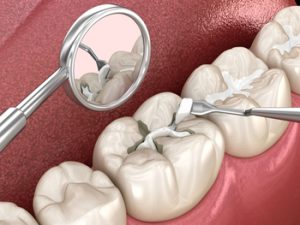Composite bonding has become a popular and cost-effective solution for enhancing your smile. Whether you’re covering chips, closing gaps, or reshaping a tooth, it offers a natural look without the high cost of porcelain veneers. But what happens when your natural teeth start to stain or darken, and your bonded teeth stay the same colour? Can you whiten composite bonding? Let’s explore.
First, What Exactly Is Composite Bonding?
Composite bonding, also called dental bonding or tooth bonding, is a cosmetic dental procedure where a dentist applies a tooth-coloured resin material to your teeth. This composite resin is shaped and hardened using a special light, bonding it securely to your natural tooth enamel.
It’s a non-invasive, quick, and relatively affordable way to restore or enhance the appearance of damaged teeth, fix chips, reshape edges, or cover small gaps.
The Big Question: Can You Whiten Composite Bonding?
 In short, you cannot whiten composite bonding like you whiten natural teeth.
In short, you cannot whiten composite bonding like you whiten natural teeth.
Most teeth whitening treatments, whether over-the-counter whitening products or professional tooth whitening at the dentist, use hydrogen peroxide or carbamide peroxide. These whitening agents effectively bleach natural tooth enamel but don’t work on composite resin.
That means if you try to whiten your teeth after bonding, only your natural teeth will respond to the whitening. The bonded teeth will stay the same colour as they were when first applied, potentially leading to an uneven look.
Why Doesn’t Composite Resin Respond to Whitening?
The reason lies in the nature of the resin material. While your natural teeth are porous and absorb the whitening agents, the composite resin is non-porous. It doesn’t allow these agents to penetrate or change the colour of the material. That’s why even the strongest professional whitening treatment can’t whiten bonded teeth.
In fact, trying to do so repeatedly may even damage the bonding material, leaving your smile looking patchy or dull.
So, What Can You Do If Your Bonding No Longer Matches?
If your teeth bonded with composite have started to look different from your natural teeth, or if you’re unhappy with your overall tooth colour, you have a few options:
1. Whiten Your Natural Teeth First
If you’re planning to get composite bonding, it’s a great idea to do any desired tooth whitening beforehand. That way, the bonding material can be colour-matched to your new tooth colour, giving a consistent, bright white smile.
2. Polish the Bonding
Sometimes, the bonded tooth may appear dull or stained due to surface stains from red wine, coffee, tea, or stain-causing foods. In these cases, your dentist may be able to remove surface stains by gently polishing the bonding.
While this won’t whiten composite in the true sense, it can brighten it slightly by removing built-up stains.
3. Replace Old Bonding
If the staining is deep or the composite resin has discoloured significantly, the best option might be to replace the old bonding altogether. Your dentist can remove the existing resin and reapply new bonding material, matching it to your current tooth colour for a refreshed look.
Keep Your Composite Bonding Looking Its Best
Even though you can’t whiten composite bonding, you can certainly keep it looking good for longer with proper dental care:
- Brush and floss regularly: Maintaining good oral hygiene helps prevent plaque buildup and surface stains.
- Use non-abrasive toothpaste: Avoid whitening toothpaste that may be too harsh and scratch the resin material.
- Watch what you eat and drink: Limit staining foods and drinks like coffee, tea, and red wine.
- Quit smoking: Tobacco products are notorious for staining both natural tooth enamel and bonding material.
- Visit your dentist regularly: Professional cleans help maintain both your natural teeth and composite bonding.
Whitening Toothpaste and Bonding: Do They Help?
Some people turn to whitening toothpastes in hopes of lifting stains from their bonded teeth. While these can help remove surface stains from natural teeth, they generally have little effect on bonded areas. Worse, if the toothpaste is too abrasive, it can scratch the composite resin, causing it to pick up stains more easily in the future.
If you’re unsure, ask your dentist to recommend a gentle toothpaste that’s safe for bonded surfaces.
 When to Consider Alternatives Like Porcelain Veneers
When to Consider Alternatives Like Porcelain Veneers
If your composite bonding is repeatedly staining or not providing the results you want, your dentist may suggest other cosmetic options, such as porcelain veneers. While more costly, porcelain veneers are highly resistant to staining and provide a long-lasting solution for a brighter smile.
They’re also a permanent procedure, so they require a bit more consideration before proceeding.
Quick FAQ: Composite Bonding and Whitening
Can you whiten composite bonding at home?
No, at-home whitening kits and whitening products won’t change the colour of composite resin.
Will professional whitening treatments work on bonded teeth?
No, only your natural teeth will lighten. Bonded teeth stay the same shade.
What if my bonding no longer matches my teeth?
You may need to replace the bonding or polish the surface to restore a consistent look.
Can whitening toothpaste help?
It might help remove surface stains from natural teeth, but has a limited effect on bonded areas. Use only non-abrasive versions.
Final Thoughts: It’s About Planning Ahead
So, can you whiten composite bonding? Not really. But you can whiten your natural teeth first, plan your cosmetic treatment around your desired shade, and maintain good habits to prolong the life of your bonding.
If you’re thinking about bonding or already have bonded teeth, book an appointment with Advanced Dental Care Dubbo at (02) 6188 7103 and talk to your dentist about your options. With the right planning and care, you can enjoy a white smile that looks natural, even, and confident.
References
- Colgate. (n.d.). What is good oral hygiene? Colgate. https://www.colgate.com/en-us/oral-health/adult-oral-care/what-is-good-oral-hygiene
- Bupa Dental Care. (n.d.). Composite bonding. Bupa. https://www.bupa.co.uk/dental/dental-care/treatments/composite-bonding
- Cleveland Clinic. (n.d.). Dental veneers. Cleveland Clinic. https://my.clevelandclinic.org/health/treatments/23522-dental-veneers







